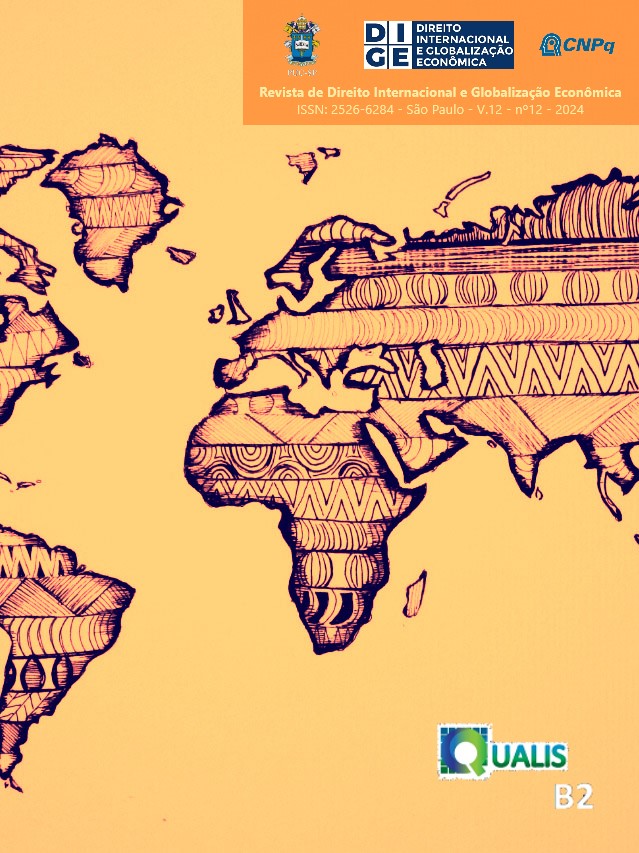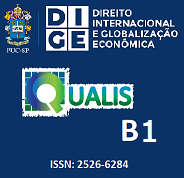The invasion of Ukraine and the need for a conjunctive-dissociative grant of humanitarian actions
DOI:
https://doi.org/10.23925/2526-6284/2023.v12n12.65503Palavras-chave:
Human Rights; Invasion; Ukraine; Humanitarian actionsResumo
Objective: the issues related to human rights in the current world scenario, in which the invasion of Ukraine by Russia and the need to implement subsidies for humanitarian actions on a connective-dissociative nature are presented. Methodology: the studies are based on a deductive scientific methodology, through bibliographic review of literature on books about this topic and scientific articles, as well as the critical observation of the economic, social, and hermeneutic phenomenology. Justification: in view of the resumption in the world scenario of hate speech with Nazi and fascist biases, there is a preeminent and exponential need for the reaffirmation of human rights contemporaneously. The present study is also justified and reaffirmed by this need to bring to the center of the academy a re-reading of human rights, especially in view of the recent event characterized by the invasion of Ukraine, a sovereign country, in an unfounded and unjustified way by another country, equally sovereign, Russia. Results: (i) the unfounded and unjustified invasion violating several rules of international law; (ii) the manifest violation of human rights and the commission of war crimes by Russia; and (iii) the urgent need for joint-dissociative humanitarian action by all countries involved or not, directly or indirectly in this armed conflict. Contribution: the scientific contribution is a continuous and resilient need on core and peripheral concepts involving human rights, their effectiveness and their implementation mainly in view of their manifest violation as witnessed worldwide in the armed conflict involving the invasion of Ukraine.
Referências
AGUILA, Y.; BELLIS, M.-C. de. Um marciano nas Nações Unidas ou reflexões ingênuas sobre a governança mundial do meio ambiente. Direitos Democráticos & Estado Moderno, v. 2, n. 5, p. 3–24, 21 set. 2022.
ALBUQUERQUE, Letícia; PERTILLE, Thais Silveira. O princípio da dignidade humana como salvaguarda da proteção ao refugiado. Revista Jurídica - Unicuritiba, v. 3, n. 48, p. 358–387, 2017.
APPLEBAUM, Anne. Cortina de ferro: o esfacelamento do Leste Europeu (1944-1956). São Paulo: Três Estrelas, 2016.
ARENDT, W. B. Hannah. Homens em tempos sombrios. São Paulo: Companhia das Letras, 1987.
BRASIL. Direitos Humanos: atos internacionais e normas correlatas. 4. ed. Brasília: Senado Federal, Coordenação de Edição Técnicas, 2013.
BRASIL, B. N. Guerra na Ucrânia: por que o mundo precisa dos grãos vendidos pelo país? Disponível em: https://www.bbc.com/portuguese/internacional-62272076. Acesso em: 5 out. 2022
BROWN, Archie. Ascensão e queda do comunismo. Rio de Janeiro: Record, 2011.
COMPARATO, Fábio. Konder. A afirmação histórica dos Direitos Humanos. 10. ed. São Paulo: Saraiva, 2015.
GONÇALVES, Rodrigo. P. Pezine.; CENCI, Daniel. Rubens.; STEFFLER, Hellin. Thaís. Canibalismo social. Direitos Democráticos & Estado Moderno, v. 2, n. 5, p. 123–139, 21 set. 2022.
HABERMAS, Jürgen. Pensamento pós-metafísico: estudos filosóficos. Rio de Janeiro: Tempo Brasileiro, 1990.
HABERMAS, Jürgen. A constelação pós-nacional: ensaios políticos. São Paulo: Littera-Mundi, 2001.
LÖWEN SAHR, C. L.; HEIDRICH, A. L. Translocalidades menonitas no contexto da América Latina e do Caribe: reflexões a partir do caso do Paraguaí. Geousp – Espaço e Tempo, v. 20, n. 3, p. 536–550, 2016.
PIOVESAN, Flávia C. Temas de Direitos Humanos. 9. ed. São Paulo: Saraiva, 2016.
PIOVESAN, Flávia C. Direitos humanos e o direito constitucional internacional. 4. ed. São Paulo: Max Limonad, 2000.
PIOVESAN, Flávia. C. Direitos humanos e justica internacional: um estudo comparativodos sistemas regionais europeu, interamericano e africano. São Paulo: Saraiva, 2018.
REIS, Rossana Rocha; MENEZES, T. S. Direitos humanos e refúgio: uma Revista, análise sobre o momento anterior à determinação do status de refugiado. Revista de Sociologia e Política, v. 22, n. 9, p. 61–83, 2014.
RIBEIRO, C. de O. Pluralismo religioso, direitos humanos e democracia. Horizonte, v. 13, n. 40, p. 1805–1825, 2015.
SALIS, A. U. de. O silêncio do Leste: refugiados do stalinismo no Paraná. [s.l.] Pontifícia Universidade Católica de São Paulo, São Paulo, Brasil, 2020.
SILVA, J. A. da. Teoria do conhecimento constitucional. São Paulo: Editora Malheiros, 2014.
SILVA, L. B. da. Por que repensar o humano? a biopolítica, o biopoder e o direito. Direitos Democráticos & Estado Moderno, n. 3, p. 248–249, 20 dez. 2021.




